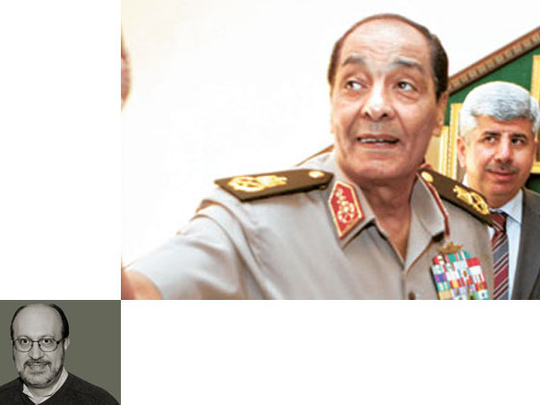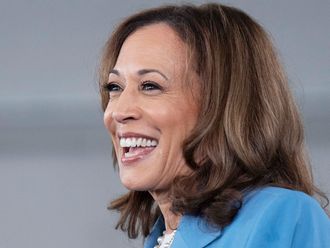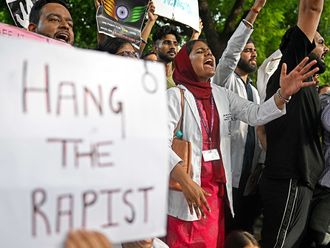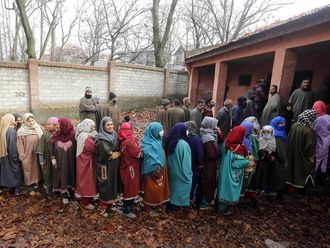
Among Egypt's greatest contributions to history were the many pharaohs who ruled a land that made immense contributions to global civilisations. From Osiris to Ptolemy 15, including, perhaps, the greatest leader of them all, Ramses II, pharaohs reigned with absolute power.
After the 1952 revolution, which overthrew the monarchy, Cairo lived under four contemporary military pharaohs, who pretended to be larger than life, even if none of them could possibly compare with Egypt's original builders.
Presidents Mohammad Najeeb, Jamal Abdul Nasser, Anwar Sadat and Hosni Mubarak were all soldiers, not statesmen. Field Marshal Hussain Tantawi, who effectively assumed the country's governance in the aftermath of the January 25 revolution, strongly believes that his Supreme Council of the Armed Forces (SCAF), grants him Pharaonic licence.
His military council, which has now been in power for 10 months in what was supposed to be a care-taking capacity, is disappointed that revolutionary "forces" are not grateful. Tantawi, his generals, and the civilian government the SCAF oversees, feel that young Egyptians should thank the military for their successes.
Regrettably for Tantawi, Egyptians no longer want pharaohs to rule them, and while the military has restrained itself — especially when compared with its Syrian, Yemeni and Libyan counterparts — it fell into a classic trap, namely to consider itself to be the guardian of the state.
While the institution of the military remained pre-eminent before January 25, and is likely to continue its role for a very long period of time, it is no longer possible for the army to act as it were the sole guarantor of state institutions. Understandably, the Egyptian military was not able to share power, as it enjoyed absolute power since 1952.
Turkish model
Unlike his predecessors, Tantawi contemplated the Turkish model, with the military playing key behind-the-scenes roles, though even Ankara evolved on that score. In the event, young Egyptians who sacrificed their lives to ensure basic freedoms, rejected both models, with the SCAF's dilemma reaching acute proportions.
To be sure, Tantawi and his generals argued that the military was ideally placed to end any putative quarrels between various civilian elements, warning of potential Islamist forces gaining power. This is a canard at best since the real threat that faces Egypt today is the loss of its democratising spirit.
Awakened masses have rejected closed-door machinations and insist on their right to elect legitimate representatives. In turn, what is on their agenda is even more ambitious, with a duly elected parliament empowered to eventually vote on a new constitution. There are even hopes that the people will elect their presidents who would serve for limited terms. No more 30 or 40 year reigns in a republic.
For nearly 10 months, Tantawi and his SCAF failed in their duty to end repeated attacks on Copts. Only the Wafd Party, whose distinguished legacy was tarnished under the four contemporary pharaohs, offered a message of reconciliation.
New dictatorship
Whether Cairo has understood that the military will henceforth be subservient to civilian leaders is too early to determine. What is clearer, however, is a growing determination that the military will not be allowed to hide future military budgets from parliamentary scrutiny. While everyone respects the army, even hope that the institution remains a guarantor of the revised constitution, no one is ready for a new dictatorship.
Instead, Egyptians want a timely vote for parliament, an end to martial law, and presidential elections by April 2012. Incredibly, SCAF leaders have failed to win the all too critical public relations war, and wasted precious time. Hardly any dialogue occurred at the political level save for silly accusations against the Brotherhood, whose well-oiled electoral machine hums at its steady pace.
At this point, Egyptians are back and they will sweep away Tantawi just like they swept Mubarak from power, with serious consequences for the military if the latter persist in their obduracy. Even if Tantawi filled a huge political vacuum after Mubarak was ousted from power, and although the ‘opposition' failed to designate a unifying leader, revolutionary voices clamour for civilian rule.
Egyptians have displayed immense patience, but the times are changing throughout the Arab world, and it behoves transitional leaders, including its established military, to take note.
In a real democracy, which Egypt will eventually become, the military will serve the nation by defending core security interests topped by basic human rights. For it should be clear that marshals have no intrinsic rights to rule especially to defend an elite's financial interests as is the case in Egypt. For better or worse, but mostly for the better, a new world order is rising. One in which freedom for everyone will be the norm. Let's get used to it.
Dr Joseph A. Kechichian is a commentator and author of several books on Gulf affairs.












